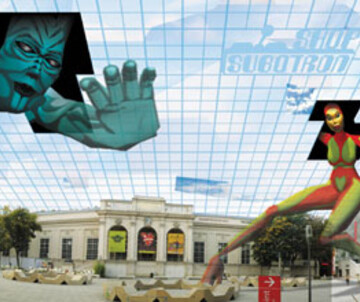24.11.2007 to 24.11.2007
SUBOTRON electric MEETING : mobile augmented reality games
FILM & DIGITAL CULTURE


Sa. 24.11.07, 19:00 – 22:00
SUBOTRON electric MEETING : mobile augmented reality games
Veranstaltungsreihe zur Theorie von Computerspielen 2007
Museumsquartier / quartier21 / QDK / electric avenue, 1070 Wien
Eintritt frei !
http://subotron.com/566-sa-241107-subotron-electric-meeting-pervasive-games/
Durch die Verfügbarkeit mobiler leistungsstarker Computer erlangen Mobile Augmented Reality Games eine zunehmende Verbreitung. Augmented Reality ist eine Technologie, die es ermöglicht die reale Umgebung mit virtuellen Objekten und Spielartefakten zu kombinieren. Der Spieler nimmt dabei sowohl die reale Umgebung als auch die virtuelle Spielewelt wahr. Im Unterschied zur Virtual Reality bleibt die reale Umgebung erhalten und wird in das Spiel einbezogen. Die Veranstaltung führt in Augmented Reality ein und stellt verschiedene mobile und pervasive Augmented Reality Games vor.
Irma Lindt beginnt den Vortrag mit einer Einführung in die Konzepte des Pervasive Computings und der Pervasive Games. Dabei wird das Spiel “Epidemic Menace” (http://www.epidemic-menace.de) im Detail vorgestellt.
Daniel Wagner spricht danach über Mobile Augmented Reality mit Schwerpunkt auf Mobiltelephone. Die Geschichte dieser Technology, sowie der aktuellen Stand der Technik und zukünftige Marktchancen werden analysiert.
Vortragende:
Irma Lindt (Fraunhofer Institute for Applied Information Technology FIT, D)
Since 2005 Doctorate at the University of Koblenz, Computer Science Faculty, Institute for Computational Visualistics, Germany, supervisor Prof. Dr. Stefan MüllerSince 2002 Research associate at Fraunhofer FIT, department Collaborative Virtual and Augmented Environments (CVAE) 2001 - 2002 Studies in Computer Science, Eastern Michigan University, US, graduated as Master of Science in Computer Science (MSc CS) 2000 - 2001 Studies in Computer Science, with a major in multimedia, University of Applied Sciences Karlsruhe, Germany, graduated as Master of Science in Computer Science (MSc CS) 1996 - 2000 Studies in "Medien und Informationswesen" (media and information technology), University of Applied Sciences Offenburg, Germany, gratuated as Dipl.-Ing. (FH)
http://www.fit.fraunhofer.de/services/cvae.html
Daniel Wagner (Institute for Computergraphics and Vision, TU Graz)
Daniel Wagner is a PhD candidate student and received his MSc from Vienna University of Technology. During his studies he worked as a contract programmer and joined Reality2, developing VR software. After finishing his Computer Science studies, Daniel was hired as a lead developer by BinaryBee working on high-quality single- and multi-user webgames.
Next he worked as a developer for Tisc Media, doing 3D engine development. Recently Daniel was hired as a consultant by Greentube for the development of “Ski Challenge ’05″. In 2006 he was an intern at HITLab New Zealand.
Daniel currently has a job as a researcher at Graz University of Technology, doing his PhD thesis on truly mobile Augmented Reality. His current research interests are real-time graphics and massively multi-user augmented reality on mobile devices. He is the head of the Studierstube Handheld AR project and developed the well-known “InvisibleTrain” and “Virtuoso” projects.
http://www.icg.tu-graz.ac.at/